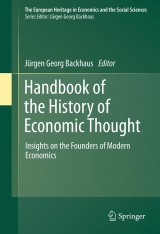Details

Handbook of the History of Economic Thought
Insights on the Founders of Modern EconomicsThe European Heritage in Economics and the Social Sciences, Band 11
|
213,99 € |
|
| Verlag: | Springer |
| Format: | |
| Veröffentl.: | 12.11.2011 |
| ISBN/EAN: | 9781441983367 |
| Sprache: | englisch |
| Anzahl Seiten: | 728 |
Dieses eBook enthält ein Wasserzeichen.
Beschreibungen
<p>This reader in the history of economic thought challenges the assumption that today’s prevailing economic theories are always the most appropriate ones. As Leland Yeager has pointed out, unlike the scientists of the natural sciences, economists provide their ideas largely to politicians and political appointees who have rather different incentives that might prevent them from choosing the best economic theory. In this book, the life and work of each of the founders of economics is examined by the best available expert on that founding figure. These contributors present rather novel and certainly not mainstream interpretations of the founders of modern economics. </p><p>The primary theme concerns the development of economic thought as this emerged in the various continental traditions including the Islamic tradition. These continental traditions differed substantially, both substantively and methodologically, from the Anglo-Saxon orientation that has been dominant in the last century for example in the study of public finance or the very construct of the state itself. This books maps the various channels of continental economics, particularly from the late-18th through the early-20th centuries, explaining and demonstrating the underlying unity amid the surface diversity. In particular, the book emphasizes the writings of John Stuart Mill, his predecessor David Ricardo and his follower Jeremy Bentham; the theory of Marginalism by von Thünen, Cournot, and Gossen; the legacy of Karl Marx; the innovations in developmental economics by Friedrich List; the economic and monetary contributions and “struggle of escape” by John Maynard Keynes; the formidable theory in public finance and economics by Joseph Schumpeter; a reinterpretation of Alfred Marshall; Léon Walras, Heinrich von Stackelberg, Knut Wicksell, Werner Sombart, and Friedrich August von Hayek are each dealt with in their own right.</p>
<p>Introduction.- The Tradition of Economic Thought in the Mediterranean World from the Ancient Classical Times Through the Hellenistic Times until the Byzantine Times and Arab-Islamic World.- Mercantilism.- The Cameralists: Fertile Sources for a New Science of Public Finance.- The Physiocrats, <i>Lluis Argemí d'Abadal.- </i>Adam Smith: Theory and Policy<i>.-</i>Life and work of David Ricardo (1772-1823)<i>.- </i>John Stuart Mill’s Road to Leviathan: Early Life and Influences<i>.- </i>John Stuart Mill’s Road to Leviathan: The Principles of Political Economy.- Jeremy Bentham (1748-1832).- Johann Heinrich von Thünen – a Founder of Modern Economy.- The legacy of Karl Marx.- Friedrich List striving for Economic Integration and Development.- The <i>Entwicklung </i><b>according to Gossen.- </b>Gustav Schmoller as a Scientist of Political Economy<i>.- </i>The Empirical and Inductivist Economics of Professor Menger.- Antoine Augustin Cournot.- Léon Walras: What cutes know and what they should know.- Knut Wicksell and Contemporary Political Economy<i>.- </i>The Scientific Contributions of Heinrich von Stackelberg.- Joseph Alois Schumpeter: The Economist of Rhetoric.- Against rigid rules - Keynes’s Economic Theory<i>.- </i>Keynes’s “long struggle of escape,”.- John Maynard Keynes and the Theory of the MonetaryEconomy.- James Steuart and the Theory of the Monetary Economy.- Friedrich August Hayek (1899-1992)<i></i></p>
<p>Jürgen G. Backhaus (*1950), JSD 1976, PhD (Econ) 1985, holds the Krupp Chair in Public Finance and Fiscal Sociology at Erfurt University since November 2000. Between 1986 and 2000, he has held the chair in Public Economics at Maastricht University. In 2006 he received the Cross of the Order of Merit of the Federal Republic of Germany (Knight’s Cross), in September 2004 he was awarded an honorary doctorate by the University of Thessaly (Greece). In 1994 he founded (with Frank H. Stephen) the European Journal of Law and Economics, of which he is now the only editor. He has published 60 books and monographs, about 200 articles in refereed journals and book chapters, 28 scholarly notes and 63 reviews. His research interests span economics, but also neighboring disciplines such as law, fiscal sociology and environmental sciences.</p>
<p>This reader in the history of economic thought challenges the assumption that today’s prevailing economic theories are always the most appropriate ones. As Leland Yeager has pointed out, unlike the scientists of the natural sciences, economists provide their ideas largely to politicians and political appointees who have rather different incentives that might prevent them from choosing the best economic theory. In this book, the life and work of each of the founders of economics is examined by the best available expert on that founding figure. These contributors present rather novel and certainly not mainstream interpretations of the founders of modern economics.</p><p> </p><p>The primary theme concerns the development of economic thought as this emerged in the various continental traditions including the Islamic tradition. These continental traditions differed substantially, both substantively and methodologically, from the Anglo-Saxon orientation that has been dominant in the last century for example in the study of public finance or the very construct of the state itself. This books maps the various channels of continental economics, particularly from the late-18th through the early-20th centuries, explaining and demonstrating the underlying unity amid the surface diversity. In particular, the book emphasizes the writings of John Stuart Mill, his predecessor David Ricardo and his follower Jeremy Bentham; the theory of Marginalism by von Thünen, Cournot, and Gossen; the legacy of Karl Marx; the innovations in developmental economics by Friedrich List; the economic and monetary contributions and “struggle of escape” by John Maynard Keynes; the formidable theory in public finance and economics by Joseph Schumpeter; a reinterpretation of Alfred Marshall; Léon Walras, Heinrich vonStackelberg, Knut Wicksell, Werner Sombart, and Friedrich August von Hayek are each dealt with in their own right.</p><p>
Provides a thorough presentation and consideration of the founders of modern economics Adds a continental European perspective to traditional Anglo-American scholarship, delivering an alternative history of economic thought Contains contributions from the leading international experts in the study of each economist Includes supplementary material: sn.pub/extras


















